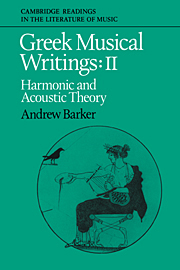Book contents
- Frontmatter
- Contents
- Acknowledgements
- Abbreviations, texts and typographic conventions
- Introduction
- 1 Pythagoras and early Pythagoreanism
- 2 Plato
- 3 Aristotle
- 4 The Aristotelian Problemata
- 5 The Peripatetic De Audibilibus
- 6 Theophrastus
- 7 Aristoxenus
- 8 The Euclidean Sectio Canonis
- 9 Minor authors quoted by Theon and Porphyry
- 10 Nicomachus
- 11 Ptolemy
- 12 Aristides Quintilianus
- Bibliography of works by modern authors
- Index of words and topics
- Index of proper names
6 - Theophrastus
Published online by Cambridge University Press: 06 January 2010
- Frontmatter
- Contents
- Acknowledgements
- Abbreviations, texts and typographic conventions
- Introduction
- 1 Pythagoras and early Pythagoreanism
- 2 Plato
- 3 Aristotle
- 4 The Aristotelian Problemata
- 5 The Peripatetic De Audibilibus
- 6 Theophrastus
- 7 Aristoxenus
- 8 The Euclidean Sectio Canonis
- 9 Minor authors quoted by Theon and Porphyry
- 10 Nicomachus
- 11 Ptolemy
- 12 Aristides Quintilianus
- Bibliography of works by modern authors
- Index of words and topics
- Index of proper names
Summary
Theophrastus followed Aristotle as head of the Peripatetic school or Lyceum (much to the chagrin of Aristoxenus, so the gossip ran, who had hoped to succeed himself). His tenure lasted from 322 to about 287 b.c. He wrote voluminously, and though he shows little originality in strictly philosophical matters, where he seldom quarrelled with Aristotle's opinions, he nevertheless made two important contributions to learning. One was in botany, a science in which his achievements are comparable to those of Aristotle in zoology. His botanical handbook, the Historia Plantarum, survives more or less intact (an excerpt on the reeds used to make the mouthpieces of auloi is quoted in GMW vol. 1 ch. 13). The second was in the history of philosophy. His writings on the Presocratic cosmologists, now lost, were the main source for most later Greek accounts, on which the bulk of our own knowledge of them in turn depends.
Reports in various later sources give evidence of Theophrastus' lively interest in music. Porphyry's citation shows that his work On Music ran to at least two books, and his musical writings seem to have been extensive and diverse. (For references in other ancient writers to his views on music see n. 44 below.) Only a few fragments and brief paraphrases now survive, and of these much the longest and most interesting is the one translated below.
- Type
- Chapter
- Information
- Greek Musical Writings , pp. 110 - 118Publisher: Cambridge University PressPrint publication year: 1990



